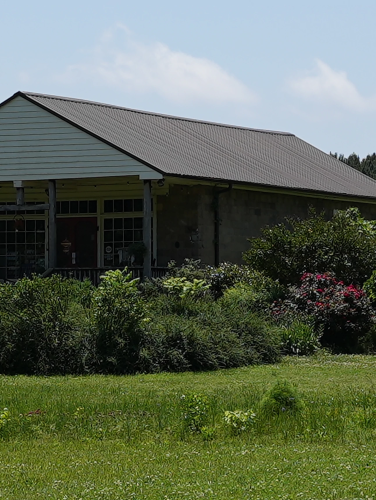
Bradford Store
(ca. 1911)
The Bradford Store has served the Ramah community of northwest Mecklenburg County for more than a century.
15915 Davidson-Concord Rd, Davidson, NC 28036
The William Bradford Store, part of the Bradford family’s farmstead (located across Davidson-Concord Road from the store), flourished in the Ramah Community from the 1800s through the mid-twentieth century as an integral part of the northwest Mecklenburg County rural farming community that centered around Ramah Presbyterian Church. That era proved to be one of the most prosperous times for farmers in the area, thanks to innovations in fertilizer and equipment. Those innovations, and Charlotte’s emergence as a regional cotton trading and textile hub, made cotton both easy to grow and to sell, allowing farmers like William Bradford to profit from the post-Civil War cotton boom.
Property Quick Links
Between 1890 and 1928, Bradford managed a large farmstead situated prominently along the Davidson Concord Road, growing cotton and corn. Bradford also exhibited an entrepreneurial talent, supplementing the family’s agricultural income with several profitable business ventures that would make the Bradford farm a hub for the surrounding community. He constructed the one-story general store across the road from his home in 1911. The Bradford Store carried farming equipment, groceries, cloth, livestock, and a host of other provisions. By 1913, Bradford had constructed a cotton gin just behind the store. Inspired by the gin’s success, he added a blacksmith shop and later a sawmill. Farmers could get their cotton ginned and their horses shod while they bought feed and other supplies. In winter months, they drove in to sit around the store’s big potbellied stove and swap stories. Bradford’s popularity among his peers extended beyond his store; he was elected and served as county commissioner from 1912 to 1914, and again from 1916 to 1920.
In addition to its significance as a social center and community store, the Bradford Store is also architecturally significant as an early example of hand-cast concrete block construction in Mecklenburg County. Although concrete blocks were used as a cheap and durable alternative to wood in small communities throughout the United States between 1900 and 1930, relatively few examples of this early form of concrete block construction survive in rural Mecklenburg County. The unusual collection of cast concrete block outbuildings throughout the Ramah Community can be attributed to the example set by William Bradford, who built his store and one of his farm outbuildings with the new material using a concrete block machine that he and his son Hurd Grier Bradford purchased in the early 1900s. William and Hurd may have used that machine to produce and sell blocks or sold similar machinery from the store to other nearby farmers.
After William’s death, Hurd continued to run the store, as well as the family’s farmstead, the cotton gin, blacksmith shop, and sawmill. In the late 1930s, the Works Progress Administration widened and paved Davidson-Concord Road. Although the change forced Hurd to shorten the front of the store, he still had room to put in a new gas pump, an amenity that would keep the store in business until the late 1950s, long after cotton farming had become unprofitable and almost nonexistent locally. The cotton gin burned to the ground in 1945, was rebuilt, and burned again in 1953. The store continues to operate today, offering a broad assortment of produce and other merchandise.

